Sprayer tyres, Rice transplanter tires and wheels, Agricultural tyres, tractor tires, Industrial Tyres, OTR Tires, skid tires, truck tires
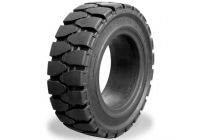
Industrial tyres play a critical role in the performance, safety, and efficiency of industrial vehicles and equipment. From forklifts and cranes to loaders and construction machinery, the right tyres are essential for ensuring stability, handling heavy loads, and navigating challenging terrains. Choosing the right tyre configuration for industrial applications can greatly affect productivity and operational costs. At Bostone, we provide high-quality industrial tyres that meet the specific demands of various industries, including construction, logistics, and manufacturing. In this article, we’ll explore the basics of industrial tyres, their configurations, and how they contribute to the smooth functioning of industrial equipment.
Industrial tyres are specially designed tyres that are used on machinery and vehicles that operate in industrial environments. These tyres differ from those used in automobiles or trucks in terms of construction, materials, and performance requirements. Industrial tyres need to withstand harsh conditions, including heavy loads, abrasive surfaces, uneven terrain, and exposure to chemicals or heat.
At Bostone, our industrial tyres, such as the Bostone ITX Series, are engineered with advanced materials and construction techniques to provide superior performance and durability. Whether used in factories, warehouses, ports, or construction sites, industrial tyres must meet the specific demands of these environments.
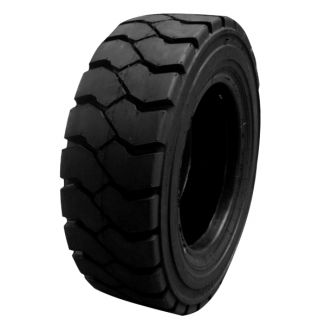
There are several types of industrial tyres available, each designed for different types of equipment and operating conditions. Choosing the right type depends on factors such as the load capacity, terrain, and working environment.
Solid tyres, also known as cushion tyres, are made entirely of solid rubber or other durable materials. These tyres are puncture-proof and offer excellent stability, making them ideal for indoor environments such as warehouses and factories where sharp objects or debris might cause damage to pneumatic tyres.
Advantages:
Disadvantages:
Pneumatic tyres are air-filled tyres, similar to those used in automobiles. These tyres provide superior shock absorption, making them ideal for outdoor applications where uneven terrain or rough surfaces are common. Pneumatic tyres offer better traction, load distribution, and a more comfortable ride than solid tyres.
Advantages:
Disadvantages:
Foam-filled tyres are pneumatic tyres that are filled with foam instead of air. This configuration combines the advantages of pneumatic tyres (traction and shock absorption) with the durability of solid tyres (puncture resistance). Foam-filled tyres are commonly used in environments where both performance and durability are required.
Advantages:
Disadvantages:
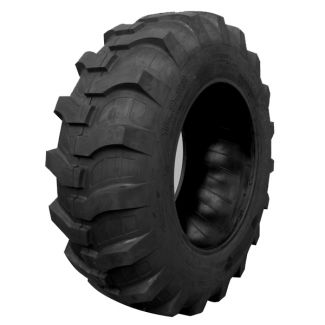
The configuration of tyres on industrial equipment is as important as the type of tyre itself. Tyre configuration impacts stability, load distribution, traction, and wear. There are several common configurations for industrial vehicles, depending on their use.
Single tyre configurations are the most common setup for industrial vehicles such as forklifts, skid steer loaders, and small construction equipment. This configuration involves one tyre per wheel position and is ideal for lighter loads and vehicles that operate on smooth surfaces.
Dual tyre configurations, also known as twin tyres, involve placing two tyres side-by-side on the same axle. This setup is often used on larger equipment such as loaders, dump trucks, and other vehicles that need to carry heavy loads on uneven or soft terrain. The dual tyre configuration provides better load distribution and increased stability.
In industries where cleanliness is critical, such as food processing plants or pharmaceutical facilities, non-marking tyres are used to prevent leaving black marks on floors. These tyres are typically made from special rubber compounds and are available in both solid and pneumatic configurations.
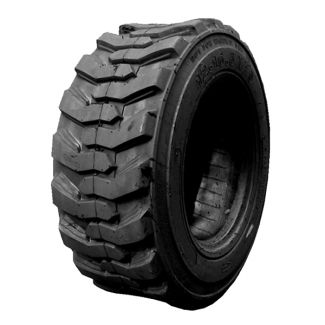
When selecting industrial tyres, several factors should be considered to ensure optimal performance and longevity.
The load capacity of the tyres must match the weight of the vehicle and the maximum load it will carry. Overloading tyres can lead to premature wear, punctures, and failure. For example, Bostone PneumaMax 500 tyres can handle load capacities of up to 10,000 kg, making them ideal for heavy-duty equipment.
The type of terrain and environment in which the vehicle will operate will determine the best tyre type. For indoor environments with smooth floors, solid tyres like the Bostone SolidX 300 are ideal. For outdoor use on rough terrain, pneumatic tyres from the PneumaMax Series offer better performance and safety.
The size of the tyre directly affects the vehicle's handling, stability, and overall performance. Ensuring the correct tyre size and configuration, such as single or dual, is essential for optimal vehicle operation. At Bostone, we offer a range of tyre sizes from 10-16.5 for compact loaders to 23.5-25 for large construction vehicles.
Industrial tyres are a vital part of ensuring the safe, efficient, and productive operation of industrial equipment. The right choice of tyre depends on factors such as load capacity, terrain, and environment. At Bostone, we provide a range of high-performance tyres, including the Bostone SolidX, PneumaMax, and Durafill Series, to meet the needs of various industries. Whether you need solid tyres for indoor applications or pneumatic tyres for rough outdoor terrain, our products are designed to withstand the toughest environments and deliver exceptional performance.
By choosing the right industrial tyre configuration and regularly maintaining your tyres, you can reduce downtime, extend the lifespan of your equipment, and increase productivity in your operations.
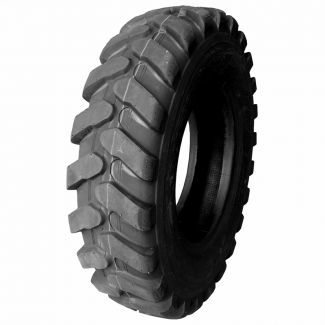
Q: What is the difference between solid and pneumatic industrial tyres?
A: Solid tyres, like the Bostone SolidX Series, are puncture-proof and ideal for indoor environments with smooth surfaces. Pneumatic tyres, such as the Bostone PneumaMax Series, are air-filled and provide better shock absorption and traction, making them suitable for outdoor use on rough terrain.
Q: How often should industrial tyres be replaced?
A: The replacement frequency depends on the tyre type, load capacity, and operating environment. For example, Bostone Durafill tyres are designed for extended durability in demanding environments, but regular inspections for wear and tear are essential to determine the optimal replacement time.
Q: Can I use non-marking tyres in outdoor environments?
A: Non-marking tyres, like the Bostone CleanLine Series , are designed primarily for indoor environments where cleanliness is crucial. While they can be used outdoors, they may not offer the same durability and performance as pneumatic or solid tyres designed for rough terrain.